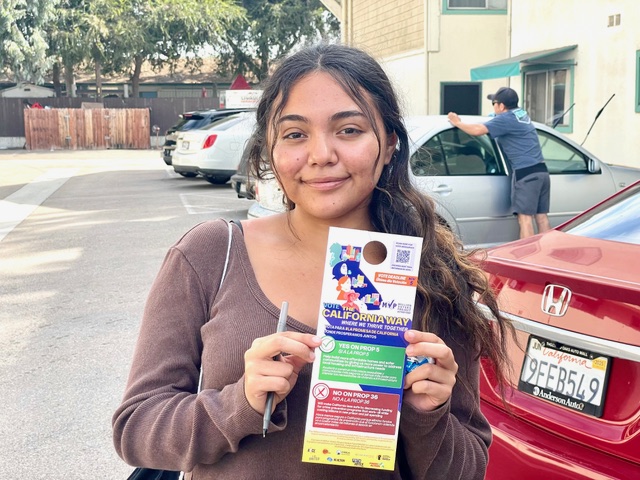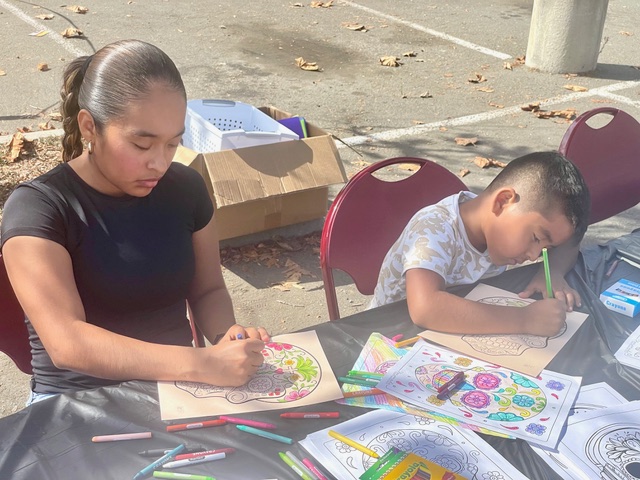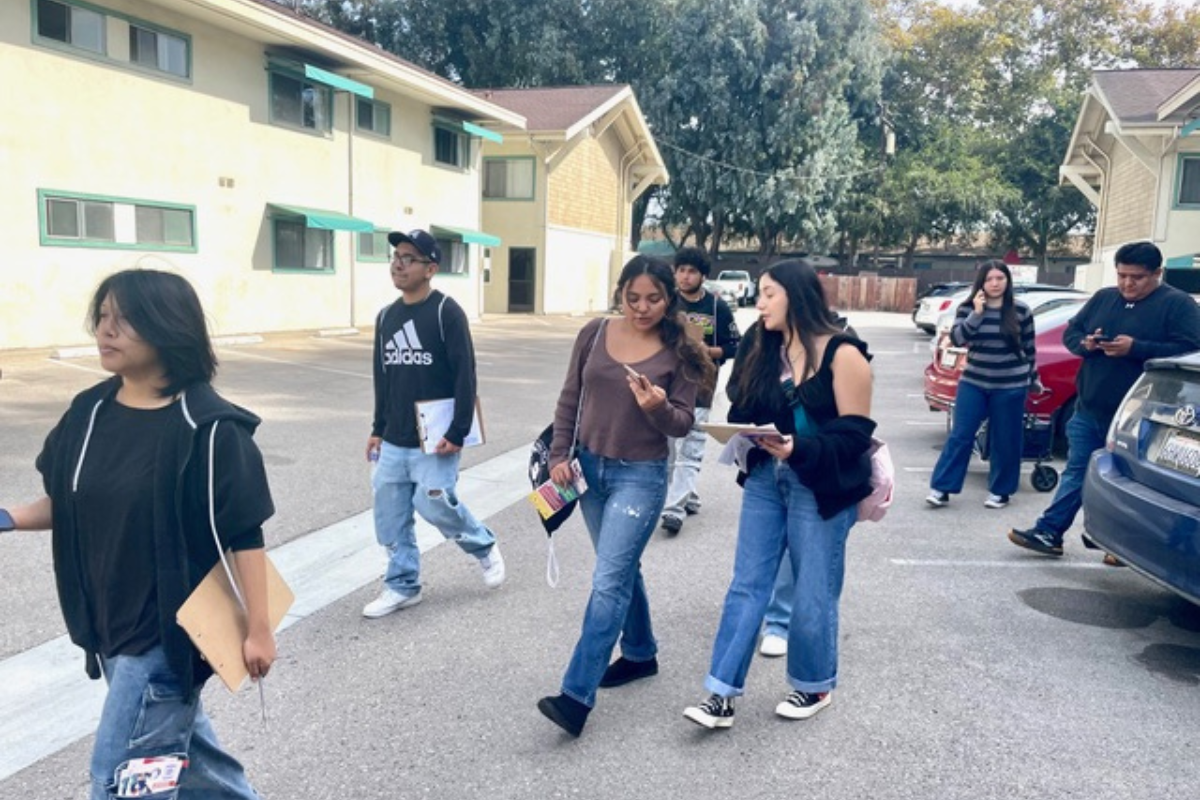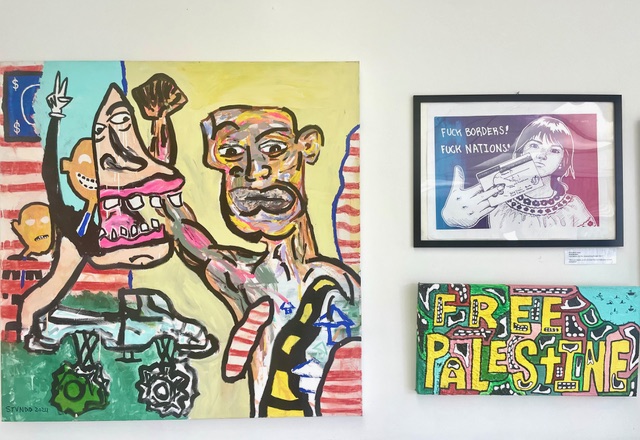SANTA BARBARA, California — The Future Leaders of America organized a three-day festival beginning Oct. 25 to inspire residents of Santa Barbara County to get involved in the community, to vote and to fight against violence to immigrants.
Santa Barbara is located two hours north of Los Angeles, where thousands of migrants are agricultural workers. In 2023, a video of a white resident shouting racist insults at a construction worker went viral. Last month, students from the indigenous community spoke out about discrimination against them in the Santa Maria School District, a city in the same county.
‘The Colors of Resistance and Go Out to Vote’ event was held at the Franklin Community Center. Participants listened to music, invited people to vote, and participated in art workshops where community involvement, and in which situations of hate and discrimination were central topics.
Art vs. Hate
“Six artists who use art to defend and help the community are participating,” said Iván Vega, interim director of FLA. “Art explains the importance of defense against hate and discrimination, especially against the immigrant community.”
Many of the artworks presented speak of the struggles for the civil rights of the people, the labor rights of immigrants and other social issues.
“It is important to use our voice to speak out and denounce violence and hate crimes,” he emphasized. “That is why it is important to get involved in the community so that they know their rights and what to do in case they are victims of violence.”
Metzli Reyes, one of the organizers of the event, said that FLA focuses on youth, helping and empowering them so they can fight for the rights of the community.
Rights Violations

She explained that art can help to raise awareness in the community about rights violations, but at the same time to show that with their vote and participation, the community can improve their lives and reduce violence.
“It was important to make them see the power that they and the community have when they vote; to elect the people they consider are good for the community and not to vote for the candidates they do not want as leaders,” said Reyes.
“It is important to vote to change the country and the governments at a local and state level. With our vote, we can improve our community and stop or minimize the hate crimes and the violence.”
Hateful Presidential Rhetoric
Unfortunately with anti-immigrant and hateful rhetoric in the presidential election, it changes how the community views itself, but also how other groups see migrants. In many cases, this encourages them to commit violent acts against certain groups, she said.
Dulce María López, one of the artists who participated at the event, said that in her workshop she tried to inspire the audience to talk about the issues that hurt and are painful and how politics affect their lives.
“The goal is to invite young people to take the first step and to get them involved in the community,” said the artist. “It is important to understand that we are all part of this community, therefore what we do matters, and then, we must ask ourselves how we are going to contribute.”
Regarding the election, López stressed that whoever wins the presidential election, the important thing is what the people are going to do for the causes that interest them.
“We have a dialogue about topics that were very serious, like the violence that indigenous people suffer in Santa María,” said López.
At the end of the workshop, the artist created an art piece inspired by the discussion.
Knocking on Doors
On Oct. 26, many young people in the county put on their tennis shoes to knock on doors and inform people about the Nov. 5 election.
Kiara, 16, cannot vote yet, but said she is very interested in people being able to exercise their vote, especially now that rents and housing prices in California are sky-high.
“Housing prices are very expensive and I am worried that families are living paycheck to paycheck,” said the young woman. She visited 60 houses to make sure that families had everything to go out and vote next week.
Normalizing Hate?
Kiara said she is saddened by the negative rhetoric against the immigrant community from one candidate in the presidential election. There is even fear that all this hateful rhetoric against Latinos could materialize on the streets and become normalized.
“That is why I am trying to talk to more people,” she explains. “We want the people to be informed and participate in the elections next Tuesday.”
Iván, 17, is in his last year of high school, and was walking the streets knocking on doors, like Kiara, to get out the vote.
“I feel a little sad and frustrated by Trump’s rhetoric,” he explained. “Latinos are hardworking people and it is not fair that certain politicians want to deport them just because they feel like it.”
Skin Tone
A young college man said that he has lived in Santa Barbara all his life, said: “I think some people feel superior and look down on us. You can immediately feel it when they talk to you at the store, the tone and the look they give you.”
“Without knowing you, they conclude things that are not true. Even Latinos themselves. If you are a Latino with white skin, you are welcome; if you are not, you can notice the difference in the treatment, especially from politicians or people who are better off economically. It is not daily, but it is in the environment and at any moment and any place it could happen.
When you are young and live with your family, you don’t feel it much, but once you leave home, it is easier to find it.”
’Trump is Not Hateful’

Elizabeth, a migrant mother who is already a citizen and can vote, said she has not experienced a situation of hate. She does not believe that Trump is as racist as people say, nor that Kamala Harris supports migrants who have been in the US for decades.
“The vice president lets in many immigrants for political asylum,” says the mother born in the State of Mexico. “But there is nothing for those who are here; the people who have worked and paid taxes for decades. There is no help for them.”
’Election Fear’
Nayeli, 20 years old, and born in the US to parents from Puebla, Mexico, said that she has felt discrimination daily in Ventura and Santa Barbara.
“If I go to the store, they see my mother or my family and immediately they stare at us as if we were going to rob something,” she said.
Although she is already eligible to vote, she says she has not done so because her family does not talk about it because no one can vote.
However, this time, she thinks she will participate in the elections, particularly because she does not want Donald Trump to win. “I am afraid that he will do what he says against Latinos,” she emphasizes. “That he will deport my family.”
The event was possible thanks to the support by a grant from the California State Library.





